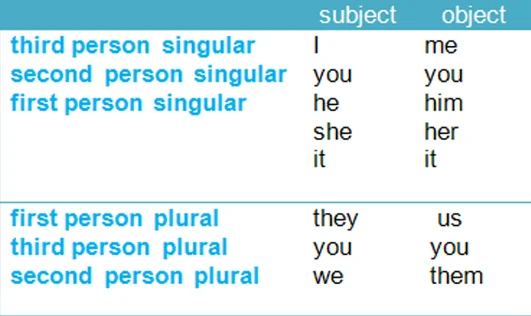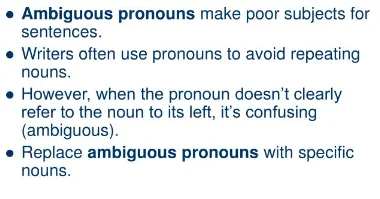Maintaining a professional and objective tone is vital when writing a research paper. This includes avoiding using first-person pronouns such as “I” and “we.” However, it is also critical to be inclusive in our language. This is where the use of “they” comes into play.
In this response, we will explore the acceptability of using “they” in a research paper and give tips on replacing first-person pronouns.
Can I use “they” in a Research Paper?
When replacing first-person pronouns such as “I” or “we,” you can use a more formal and objective writing style. This can happen through the use of passive voice or by simply rephrasing the sentence.
You can use “they” in a research paper when referring to groups or individuals in a gender-neutral way. There has been a push for more inclusive language in academic writing, and using “they” can be a way to address this issue. However, ensuring that “they” does not lead to ambiguity in the text is essential.
How to replace “they” in a Research Paper
While using “they” as a gender-neutral pronoun is acceptable, it may not be the right choice for clarity and precision in academic writing. There are multiple strategies for replacing “they” while still maintaining a professional tone:

- Use a more specific noun or pronoun: For example, you could say, “the researchers conducted the study” instead of saying, “they conducted the study,”. This clarifies who is being referred to and adds specificity to the text.
- Use the passive voice: For example, you could say, “the data was analyzed.” instead of saying, “they analyzed the data,”. Here, you avoid using pronouns and focus on the action.
- Rephrase the sentence wholly to eliminate the need for a pronoun: For example, instead of saying you could say, “the results of the study were inconclusive.” say, “they found that the results were inconclusive,” This adds clarity and specificity to the text.
Can I use ‘You’ in Research Paper Writing?
It is right to avoid using “you” in research paper writing. However, there may be exceptions in certain types of academic writing.

Using “you” in research paper writing is not recommended as it makes the paper’s tone sound informal or conversational. Maintaining a professional tone and avoiding addressing the reader directly is vital.
Instead of using “you,” use a more formal and objective writing style.
For instance, instead of saying, “you might be wondering why this is important,” say, “the significance of this topic lies in…” This adds clarity and specificity to the text.
In some cases, using the second-person perspective in certain types of academic writing, such as instructional or persuasive essays, may be appropriate. However, research papers generally require a more formal and objective style.
Reasons why Second-Person Language is not recommended in Academic Writing
1. Creates an Informal or Conversational Tone
One of the primary reasons is that it can create an informal or conversational tone. Academic writing should be serious and objective, passing information and ideas clearly and concisely.
Using second-person language, such as “you,” makes the writing sound less formal and more like a conversation between friends.
2. Assumes Reader’s Experience and Knowledge
Using “you” in academic writing seems like making assumptions about the reader’s experience and knowledge. It could be alienating or offensive to the reader if they do not identify with the assumptions being made. It is vital to avoid any language that could appear presumptuous or patronizing to the reader.
3. Imprecise and Ambiguous

The use of “you” can be ambiguous and imprecise. It is not always clear who the pronoun is referring to. Such can lead to confusion and misunderstanding, which is problematic in academic writing where clarity and precision are essential.
4. Unprofessional or Informal
The use of second-person language can appear unprofessional or informal. Academic writing is ever serious, objective, and rigorous. Therefore, using “you” makes it sound more like a personal blog post than a scholarly work.
Maintaining a professional tone in academic writing is essential to ensure the work gets the respect it deserves.
Instances when Using Second-Person Language are Allowed in Essay Writing
Here are some examples of when using second-person language is allowed in essay writing:
Instructional or Persuasive Essays
Instructional or persuasive essays use second-person language to address the reader directly. This can be the right way to engage the reader and make them feel personally invested in the topic under discussion.
For example, suppose you are writing an instructional essay on how to bake a cake; you may use second-person language to address the reader directly: “Now that you have gathered all of your ingredients, it is time to start mixing!”
Personal Narratives

You can use second-person language in personal narratives. These essays often focus on the writer’s thoughts and personal experiences. It can be effective to use second-person language to address the reader directly. This makes them feel more involved in the story.
For example, suppose you are crafting a personal narrative about a hard experience you went through. In that case, you might use second-person language to address the reader directly: “You can’t imagine how scared I was when it happened.”
Conversational Tone
Using second-person language helps to create a conversational tone in an essay. This can be appropriate in certain types of writing, like opinion pieces or blog posts.
For example, suppose you are writing an opinion piece on a controversial topic. In that case, you can use second-person language to address the reader directly: “You might be thinking that I’m crazy, but hear me out.”
Check out our suggestions on examples of English research paper topics to use.
Quoting Direct Speech
It may be appropriate to quote direct speech from someone using second-person language. In this situation, it is necessary to retain the original language in the quote, even if it uses “you.”
For example, suppose you are writing an essay on a speech by a politician who addresses the audience directly. In that case, you can include the original language of the speech, including some instances of “you.”
Examples of the second language and their correction using third-person language
- Second person: “You should always proofread your work before submitting it.”
Third-person correction: “One should always proofread their work before submitting it.”
- Second person: “You can see from this graph that the trend is going up.”
Third-person correction: “It can be seen from this graph that the trend is going up.”
